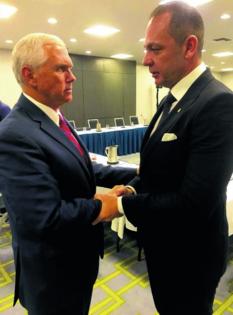Venezuelan TV mogul Gorrín charged again with money-laundering millions in Miami
Published in News & Features
A politically connected Venezuelan TV mogul has been charged with conspiring to launder $1.2 billion that federal authorities say he and other business associates stole from Venezuela’s government to invest in Europe and the United States, including buying luxury real estate in South Florida.
Raúl Gorrín, owner of the Globovisión network in Caracas, is accused of plotting with the others to bribe top officials in Venezuela’s state-owned oil company in exchange for access to lucrative government loan contracts, according to an indictment filed on Wednesday in Miami by federal prosecutors. The loan payments were routed through the government’s highly favorable currency-exchange system, producing windfall profits for Gorrín and his associates.
Gorrín, 56, who was close to Venezuela’s late president, Hugo Chávez, and his successor, Nicolás Maduro, was charged alone with one court of conspiracy to commit money laundering. If he’s ever caught and convicted, the offense carries up to 20 years in prison.
Previous Miami indictment
His case grew out of another Miami indictment filed in 2018 that charged eight associates with fleecing the national oil company, PDVSA, including senior executives and lawyers. Since that original money-laundering case, another five defendants, including Gorrín, have been charged in connection with it.
Altogether, about half of the defendants have pleaded guilty and been sentenced to prison, including a few who provided evidence against Gorrín. The other defendants, including Gorrín, are still at large in Venezuela or Europe.
At the same time, Gorrín is a defendant in a separate foreign corruption case that led to the conviction of a former Venezuelan national treasurer and her husband at a Fort Lauderdale trial in 2022. He has been designated as a fugitive in that case, which also accused him of paying bribes in exchange for hundreds of millions of dollars in government bond contracts.
His defense attorney, Howard Srebnick, could not be immediately reached for comment.
Fisher Island connection
In the new indictment, Gorrín is accused of holding key meetings a decade ago at the tycoon’s office in Caracas and at his condo on exclusive Fisher Island overlooking Biscayne Bay. There, he discussed with his banker and other associates the transfer of $600 million in ill-gotten oil funds to a European bank and eventually to the United States, according to the indictment. Some of that money was intended for Maduro’s stepsons, according to sources familiar with the investigation.
Gorrín came from humble origins in Venezuela. He became a lawyer but eventually evolved into a successful businessman. He gained control of insurance company Aseguradora La Vitalicia, which he acquired in 2008 with partners. They also joined him in the purchase of Globovisión five years later.
Gorrin became one of the wealthiest businessmen in Venezuela largely because of his close connections with key members of the Maduro regime, including the presidential family, and his predecessor, Chávez.
The sale of Globovisión was a big blow to the opposition in Venezuela, shutting down the last TV channel that challenged government censorship. The station’s programming changed dramatically after the sale, as prominent journalists resigned when the new owners tried to impose a gag rule.
In late 2017, Gorrín tried to broker an exit strategy with the Trump administration for Venezuela’s beleaguered government, according to prior Miami Herald stories, by peddling the idea that Maduro and other key government leaders might be willing to negotiate a transition in Venezuela in exchange for amnesty. Gorrín met Vice President Mike Pence and was seeking a meeting with Trump at the time, the Herald reported.
Owned properties in Cocoplum
During this same period, Gorrín and other Venezuelan business associates owned considerable real estate in the United States, including properties in the wealthy Cocoplum enclave and other parts of Coral Gables, along with a yacht, despite being part of a Venezuelan hierarchy that once drew public scorn from U.S. Sen. Marco Rubio.
“Do you know where they live?” Rubio, the Florida Republican, asked Roberta Jacobson, assistant secretary of state for the western hemisphere, at a Senate hearing in 2014 to approve sanctions against key leaders of the Venezuelan government.
“They live in Miami, where they own a mansion worth millions of dollars in Cocoplum,” Rubio said. “They drive luxury cars and they laugh at you and at us because they know they can do that with impunity.”
Gorrín’s role in the alleged money-laundering conspiracy began in December 2014, when he and others hatched a scheme to loan bolivars to the national oil company, PDVSA, in exchange for payments in euros or dollars, according to prosecutors with the U.S. Attorney’s Office and Justice Department.
The value of those funds was grossly inflated on the government’s preferred currency-exchange system. Gorrín and others in the money-laundering network used a Venezuelan associate, who would later become a confidential source for the feds, to move a portion of the oil funds to the United States.
Money laundering balloons to billions
By May of 2015, the Venezuelan money-launder conspiracy doubled to $1.2 billion, according to prosecutors in the U.S. Attorney’s Office and Justice Department. In early 2016, the Venezuelan associate approached Homeland Security Investigations in Miami about cooperating and becoming a confidential source, according to court records.
The source agreed to wear a recording device to launder $78 million that he had received from a loan contract with the national oil company, PDVSA. He met with Gorrin’s private Swiss banker and separately with a Miami securities broker to discuss money-laundering schemes, according to court records.
Both the banker and broker ended up pleading guilty to conspiracy charges and served prison time.
©2024 Miami Herald. Visit at miamiherald.com. Distributed by Tribune Content Agency, LLC.







Comments